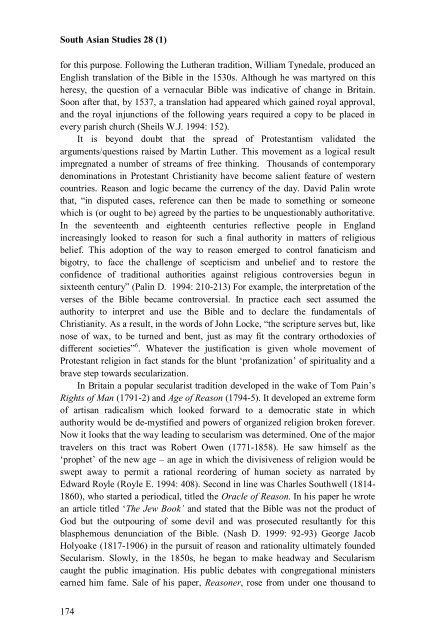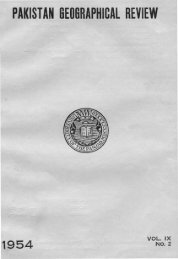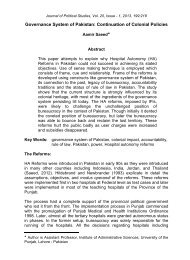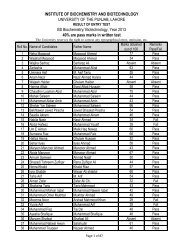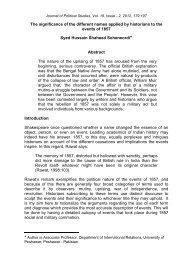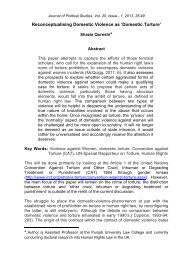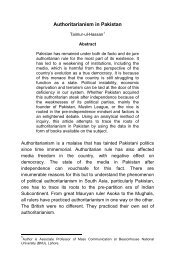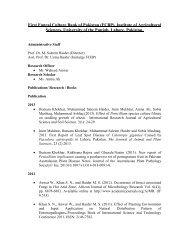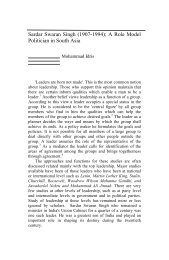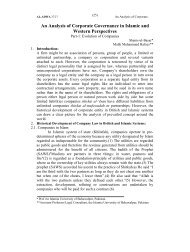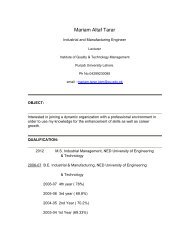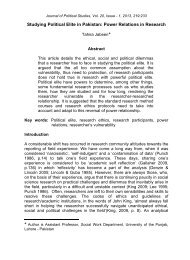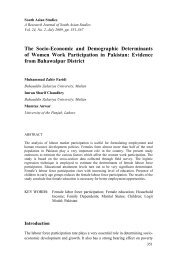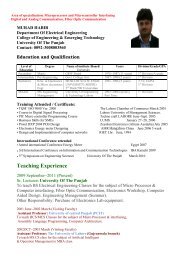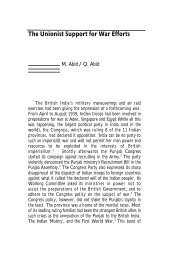Can Pakistan be a Secular State? - University of the Punjab
Can Pakistan be a Secular State? - University of the Punjab
Can Pakistan be a Secular State? - University of the Punjab
Create successful ePaper yourself
Turn your PDF publications into a flip-book with our unique Google optimized e-Paper software.
South Asian Studies 28 (1)<br />
for this purpose. Following <strong>the</strong> Lu<strong>the</strong>ran tradition, William Tynedale, produced an<br />
English translation <strong>of</strong> <strong>the</strong> Bible in <strong>the</strong> 1530s. Although he was martyred on this<br />
heresy, <strong>the</strong> question <strong>of</strong> a vernacular Bible was indicative <strong>of</strong> change in Britain.<br />
Soon after that, by 1537, a translation had appeared which gained royal approval,<br />
and <strong>the</strong> royal injunctions <strong>of</strong> <strong>the</strong> following years required a copy to <strong>be</strong> placed in<br />
every parish church (Sheils W.J. 1994: 152).<br />
It is <strong>be</strong>yond doubt that <strong>the</strong> spread <strong>of</strong> Protestantism validated <strong>the</strong><br />
arguments/questions raised by Martin Lu<strong>the</strong>r. This movement as a logical result<br />
impregnated a num<strong>be</strong>r <strong>of</strong> streams <strong>of</strong> free thinking. Thousands <strong>of</strong> contemporary<br />
denominations in Protestant Christianity have <strong>be</strong>come salient feature <strong>of</strong> western<br />
countries. Reason and logic <strong>be</strong>came <strong>the</strong> currency <strong>of</strong> <strong>the</strong> day. David Palin wrote<br />
that, “in disputed cases, reference can <strong>the</strong>n <strong>be</strong> made to something or someone<br />
which is (or ought to <strong>be</strong>) agreed by <strong>the</strong> parties to <strong>be</strong> unquestionably authoritative.<br />
In <strong>the</strong> seventeenth and eighteenth centuries reflective people in England<br />
increasingly looked to reason for such a final authority in matters <strong>of</strong> religious<br />
<strong>be</strong>lief. This adoption <strong>of</strong> <strong>the</strong> way to reason emerged to control fanaticism and<br />
bigotry, to face <strong>the</strong> challenge <strong>of</strong> scepticism and un<strong>be</strong>lief and to restore <strong>the</strong><br />
confidence <strong>of</strong> traditional authorities against religious controversies <strong>be</strong>gun in<br />
sixteenth century” (Palin D. 1994: 210-213) For example, <strong>the</strong> interpretation <strong>of</strong> <strong>the</strong><br />
verses <strong>of</strong> <strong>the</strong> Bible <strong>be</strong>came controversial. In practice each sect assumed <strong>the</strong><br />
authority to interpret and use <strong>the</strong> Bible and to declare <strong>the</strong> fundamentals <strong>of</strong><br />
Christianity. As a result, in <strong>the</strong> words <strong>of</strong> John Locke, “<strong>the</strong> scripture serves but, like<br />
nose <strong>of</strong> wax, to <strong>be</strong> turned and <strong>be</strong>nt, just as may fit <strong>the</strong> contrary orthodoxies <strong>of</strong><br />
different societies” 6 . Whatever <strong>the</strong> justification is given whole movement <strong>of</strong><br />
Protestant religion in fact stands for <strong>the</strong> blunt ‘pr<strong>of</strong>anization’ <strong>of</strong> spirituality and a<br />
brave step towards secularization.<br />
In Britain a popular secularist tradition developed in <strong>the</strong> wake <strong>of</strong> Tom Pain’s<br />
Rights <strong>of</strong> Man (1791-2) and Age <strong>of</strong> Reason (1794-5). It developed an extreme form<br />
<strong>of</strong> artisan radicalism which looked forward to a democratic state in which<br />
authority would <strong>be</strong> de-mystified and powers <strong>of</strong> organized religion broken forever.<br />
Now it looks that <strong>the</strong> way leading to secularism was determined. One <strong>of</strong> <strong>the</strong> major<br />
travelers on this tract was Ro<strong>be</strong>rt Owen (1771-1858). He saw himself as <strong>the</strong><br />
‘prophet’ <strong>of</strong> <strong>the</strong> new age – an age in which <strong>the</strong> divisiveness <strong>of</strong> religion would <strong>be</strong><br />
swept away to permit a rational reordering <strong>of</strong> human society as narrated by<br />
Edward Royle (Royle E. 1994: 408). Second in line was Charles Southwell (1814-<br />
1860), who started a periodical, titled <strong>the</strong> Oracle <strong>of</strong> Reason. In his paper he wrote<br />
an article titled ‘The Jew Book’ and stated that <strong>the</strong> Bible was not <strong>the</strong> product <strong>of</strong><br />
God but <strong>the</strong> outpouring <strong>of</strong> some devil and was prosecuted resultantly for this<br />
blasphemous denunciation <strong>of</strong> <strong>the</strong> Bible. (Nash D. 1999: 92-93) George Jacob<br />
Holyoake (1817-1906) in <strong>the</strong> pursuit <strong>of</strong> reason and rationality ultimately founded<br />
<strong>Secular</strong>ism. Slowly, in <strong>the</strong> 1850s, he <strong>be</strong>gan to make headway and <strong>Secular</strong>ism<br />
caught <strong>the</strong> public imagination. His public debates with congregational ministers<br />
earned him fame. Sale <strong>of</strong> his paper, Reasoner, rose from under one thousand to<br />
174


